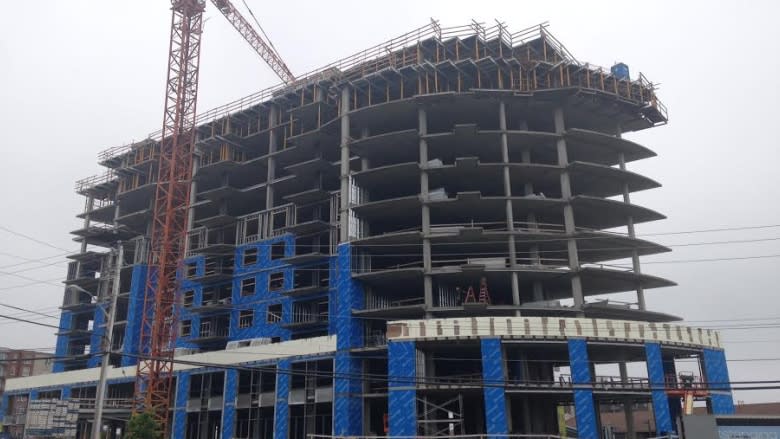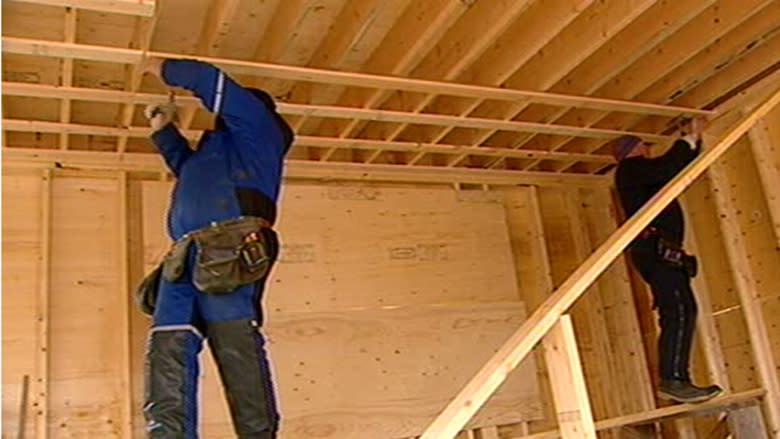Baby boomers heat up winter construction season
Temperatures may be dropping but buildings are still going up in Halifax partly due to the demand from baby boomers, according to the Canadian Mortgage and Housing Corporation.
"There's certainly been a trend that has been in play for the last three or four years where larger buildings would require crews to be on site year-round," said Guillaume Neault, principal market analyst with CMHC.
He said there is a strong demand for rental units in Halifax, much of which is coming from aging baby boomers selling their single-family homes and moving into apartments.
Between 2006 and 2011, there were 7,000 additional renter households in Nova Scotia. Five thousand of those households were occupied by people 55 years of age and older, said Neault.
Cost effective to work through winter
That demand combined with Halifax's low vacancy rate of 2.6 per cent is driving crews to work through the winter months to finish buildings and get the apartments on the market.
Neault said between 2000 and 2008 there would be roughly 600 apartment units being built a year in Nova Scotia. From 2013 onward 1,400 to 1,700 new apartment units were being built a year. The bulk of those units were in Halifax.
"It's usually more cost effective to keep going with the work. Projects have deadlines, budgets to meet. And as long as it's safe, contractors will continue with the work," said Duncan Williams, president of the Construction Association of Nova Scotia.
The association represents companies throughout Atlantic Canada that build, renovate and restore non-residential buildings, roads, bridges and other engineering projects.
"Overall cost and availability of labour are important so you can't really afford to let guys go in the middle of winter. If you can keep working, contractors are going to continue working and keep their best people around," said Williams.
Winter doesn't stop home construction
Overall there are fewer single-detached homes being built in Halifax, said Neault, but work on them is continuing through the winter.
Building homes even when it's frigid has gone on for years, according to Keith Sawlor, president of Sawlor Built Homes, which builds homes during the winter.
He said most of the time contractors have no trouble building in the cold weather, as long as foundations are poured before the ground freezes.
"Once the foundations are in the ground we carry on as though it's a regular job in the middle of summer, we actually have several homes on the go right now," he said.
The biggest winter horror stories Sawlor hears come from people whose foundations were laid after the ground had frozen. When the ground thaws a house can shift causing the foundation to crack, concrete floors to break, and walls to bow.
Sawlor said his company works to make sure its foundations are poured and backfilled before Christmas to avoid those kinds of problems.
The big benefit to winter work is that more contractors are available because there is less construction during those months, Sawlor said, adding the continued construction also allows people to move into their homes sooner.
Winter weather can be challenging
But storms can often be a pain during the winter projects, leading to lost construction days.
Even after a storm the entire worksite needs to be ploughed out. If a home doesn't have a roof, snow will have to be cleared from the inside as well before work can resume.
A storm here and there usually isn't a problem for contractors, said Sawlor. It's when there's a particularly bad winter that they run into trouble.
Guillaume Neault with CMHC said Nova Scotia recently had one of those winters.
"Winter 2015, I believe, had a six-week period that was especially harsh by Atlantic standards. During those months we recorded much less construction activity and crews had to stop working on homes that just had their foundations poured," said Neault.

 Yahoo Finance
Yahoo Finance 


